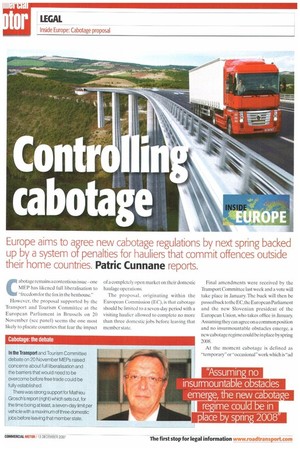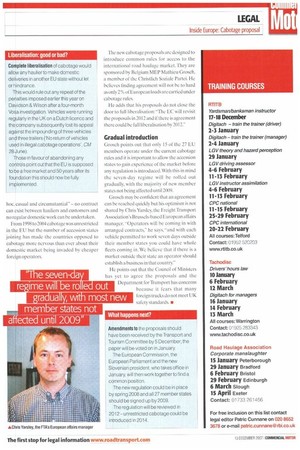Europe aims to agree new cabotage regulations by next spring
Page 36

Page 39

If you've noticed an error in this article please click here to report it so we can fix it.
backed up by a system of penalties for hauliers that commit offences outside their home countries. Patric Cunnane reports.
Cabotage remains a contentious issue -one MEP has likened full liberalisation to "freedom for the fox in the henhouse." However, the proposal supported by the Transport and Tourism Committee at the European Parliament in Brussels on 20 November (see panel) seems the one most likely to placate countries that fear the impact of a completely open market on their domestic haulage operations.
The proposal, originating within the European Commission (EC), is that cabotage should be limited to a seven-day period with a visiting haulier allowed to complete no more than three domestic jobs before leaving that member state. Final amendments were received by the Transport Committee last week and a vote will take place in January. The buck will then be passed back to the EC. thc European Parliament and the new Slovenian president of the European Union, who takes office in January. Assuming they can agree on a common position and no insurmountable obstacles emerge, a new cabotage regime could be in place by spring 2008.
At the moment cabotage is defined as "temporary"or"occasional" work which is "ad hoc, casual and circumstantial" no contract can exist between hauliers and customers and no regular domestic work can be undertaken.
From1_998 to 2004 cabotage was unrestricted in the EU but the number of accession states joining has made the countries opposed to cabotage more nervous than ever about their domestic market being invaded by cheaper foreign operators. The new cabotage proposals are designed to introduce common rules for access to the international road haulage market. They are sponsored by Belgium MEP Mathieu Grosch, a member of the Christlich Soziale Partei. He believes finding agreement will not be to hard as only 2% of European loads are carried under cabotage rules.
He adds that his proposals do not close the door to full liberalisation: "The EC will revisit the proposals in 2012 and if there is agreement there could be full liberalisation by 2012."
Gradual introduction
Grosch points out that only IS of the 27 EU members operate under the current cabotage rules and it is important to allow the accession states to gain experience of the market before any regulation is introduced. With this in mind the seven-day regime will be rolled out gradually, with the majority of new member states not being affected until 2009.
Grosch may be confident that an agreement can be reached quickly but his optimism is not shared by Chris Yarsley. the Freight Transport Association's Brussels-based European affairs manager. "Operators will be conning in with arranged contracts," he says, "and with each vehicle permitted to work seven days outside their member states you could have whole fleets coming in. We believe that if there is a market outside their state an operator should establish a business in that country."
He points out that the Council of Ministers has yet to agree the proposals and the Department for Transport has concerns because it fears that many foreign trucks do not meet UK safety standards.






















































































































































































